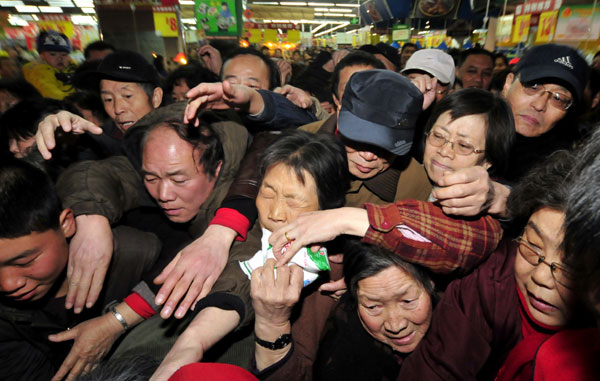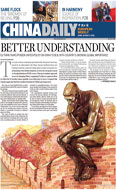Photos
Radiation fears prompt panic buying of salt
Updated: 2011-03-18 07:00
By Wang Jingqiong and Li Xinzhu (China Daily)
|
 A shopper carries bags of salt as he leaves a supermarket in central Beijing on Thursday. Residents in some Chinese cities flocked to buy iodized salt, believing it could help ward off potential radiation effects. Jason Lee/Reuters |
Worried shoppers stripped stores of salt in Beijing, Shanghai and other parts of China on Thursday in the false belief that it can guard against radiation exposure, even though any fallout from a crippled Japanese nuclear power plant is unlikely to reach the country.
The rumors have traveled widely. Text messages on mobile phones have circulated about nuclear plumes spreading from Japan throughout Asia. Rumors also spread that radiation has leaked into the sea from the Fukushima Daiichi nuclear power plant in Japan, so salt taken from the sea - not the primary source of salt in China - would be contaminated.
Other rumors have triggered similar responses elsewhere. Drugs stores and health food shops in Russia's Far East and British Columbia, Canada, have reported shortages of iodine pills, despite health officials insisting that potassium iodide is not anti-radiation.
Even the World Health Organization (WHO) was compelled to call for calm.
"Consult your doctor before taking iodine pills. Do not self-medicate!" the WHO wrote on its Twitter page Monday evening. The statement has done little to avert packs of 14 potassium iodide pills from attracting bids of up to $540 on eBay.
Back in China, the public has swarmed to shops and supermarkets to buy salt for a sense of security, despite the government's reassurance that China is not exposed to any nuclear radiation leaking from the Fukushima complex in Japan.
|
 People panic over salt at a supermarket on Thursday in Lanzhou,capital of Gansu province. The shopping rush was triggered by false rumos that iodized salt could help ward off radiation poisoning. Chen Yang/For China Daily |
China's seawater, as a source of salt, would not be affected by radioactive leaks following explosions at Fukushima, the country's marine environment watchdog said Thursday.
The National Marine Environmental Forecasting Center said in a statement that currents in the Pacific Ocean were flowing eastward from Fukushima, while China is west of Japan. "It is impossible for radioactive substances to reach China's sea areas via the ocean current," the statement said.
Meanwhile, air monitoring showed that China remained unaffected by the radioactive leaks, according to the National Nuclear Safety Administration, under China's Ministry of Environmental Protection.
Still, the wave of panic buying spread across provinces from eastern Zhejiang to southern Guangdong to western Sichuan and even the far northwestern Xinjiang Uygur autonomous region. Prices of salt jumped five-fold or 10-fold in some cities.
E-paper

Head on
Chinese household care goods producers eye big cities, once stronghold of multinational players
Carving out a spot
Back onto center stage
The Chinese recipe
Specials

British Royal Wedding
Full coverage of the royal wedding of Prince William and Kate Middleton in London. Best wishes

The final frontier
Xinjiang is a mysterious land of extremes that never falls to fascinate.

Bridging the gap
Tsinghua University attracts a cohort of foreign students wanting to come to China.




